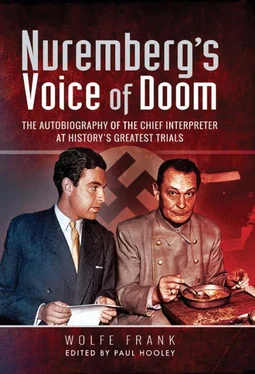‘A standout among the interpreters was Wolfe Frank, a handsome young Bavarian who had fled to England before the war and mastered English so perfectly that, unlike the others, he was used to render English into German and vice versa.’ – Brigadier General Telford Taylor, USA Chief of Counsel for War Crimes, The Anatomy of the Nuremberg Trials.
Quite apart from what Wolfe Frank has written about Nuremberg there is so much more included in his memoirs about the exploits and achievements of a man who must surely be numbered amongst the most extraordinary, courageous, flamboyant, charismatic, and romantic figures of the twentieth century; including details of his five marriages and countless love affairs, many of which, I feel obliged to warn readers, he describes intimately and graphically.
Of great importance too were documents – touched upon herein but fully recorded in a separate book to be entitled: The Undercover Nazi Hunter: Unmasking Evil in Post-war Germany [2] The Undercover Nazi Hunter: Unmasking Evil in Post-war Germany is to be published by Frontline Books during 2019.
– which cover Frank’s post war covert investigations in both East and West Germany on behalf of the New York Herald Tribune. During this period, he single-handedly tracked down the ‘fourth’ ranked SS officer on the Allies most wanted list before personally taking the Nazi’s confession and handing him over to the authorities.
The Wolfe Frank story, which pulls no punches and holds nothing back from a licentious and hedonistic private life, chronicles the astonishing adventures of a privileged Bavarian playboy of Jewish descent, who became actively involved in smuggling Jews and money out of Nazi Germany. On the point of arrest and incarceration in a concentration camp, and having been branded ‘an enemy of Germany to be shot on sight’, he was forced to flee his homeland (after just six days of marriage to a Baroness – whom he did not see again for nine years) and eventually arrived in England, penniless and unable to speak the language. Following a rapid integration that saw him rise to become CEO of several companies he was interned at the outbreak of war as ‘an enemy alien’. After a relentless and successful campaign, he was eventually released and allowed to join the British Army; where, through sheer hard work and ability, he rose to the rank of captain.
Throughout his army career, and even at Nuremberg, Frank often sailed close to the wind – for which many less capable men would have been suspended, court-martialled, or even dismissed. His value to the cause however cannot be overstated and this, it seems, made him almost indispensable – a position that he never exploited or took advantage of. Consequently, he remained popular at all levels within the army, at Nuremberg and in civilian life and, in spite of his licentious and cavalier private persona, he was also a brave, capable, highly intelligent, honourable, committed man of great integrity and ability who one would most definitely want on one’s side in a crisis.
By the end of the war Frank was so fluent in written and spoken English he was said to speak the language with the depth, clarity, expression, accent and diction of a highly educated British aristocrat. This set him apart from all others and brought him to the notice of General Eisenhower’s personal interpreter and Head of Translations, Colonel Leon Dostert, who personally interviewed and immediately seconded Frank on to the USA interpreting team. This in turn led to his eventual appointment as Chief Interpreter.
The vast majority of this book is the Wolfe Frank Story as Wolfe Frank would have wanted to see it published and all Frank’s text is printed in what is known as a serif typeface (Palatino) – as this paragraph.
However, there are passages, interspersed within the text, together with this Introduction, the Epilogue and the Notes at the end of each chapter, that I have added to clarify matters, explain situations and to add further and better particulars to what Frank has written. To clearly show a distinction from the words of Wolfe Frank, mine are printed in an alternative typeface (Gill Sans Light) – as used for this paragraph and indeed the whole of the rest of this Introduction.
My words are not intended to detract from Frank’s writing or to in any way alter the content or direction of his thoughts and/or story. Rather they are included to assist the reader to better understand certain situations Frank describes, or that he takes for granted, were more widely known at the time he committed them to paper (sometime prior to 1984).
I believe that historians, students, linguists and those interested in military matters will find Nuremberg’s Voice of Doom to be a further valuable record. I feel this book will also appeal to a much wider audience that is not so well versed in the trials and/or the terminology used. If I seem therefore at times to be ‘teaching grandmothers to suck eggs’ it is only to assist those who may be less familiar with some of the historical references and jargon used, or to more clearly explain what Frank is saying and/or to expand upon the context or situations he is describing.
Likewise, I have included seven pages of plates (Plates10 to 16) that I believe will greatly assist all readers. These pages show: a plan of the courtroom at the Palace of Justice in Nuremberg; the names and positions of all the principals involved; brief details and a photographic image of each of the defendants at the IMT; who sat where; and a short-form chart recording the counts, verdicts and sentences of the court.
Nuremberg’s Voice of Doom is a record of two interwoven themes – one of love, adventure and excitement, the other of a former German citizen’s fight for the right to become a British soldier and his extraordinary commitment to service, duty and justice. This was seen to be scrupulously fair to the prosecution, defence and the prisoners throughout what many consider to have been the greatest and most important trial the world has ever seen.
There are also some remarkable coincidences. Prior to the war Joachim von Ribbentrop (the first of the war criminals to be hanged) helped Frank regain his first wife’s passport. It was ironic therefore that it should be Frank who interpreted for him, interrogated him and then announced to him that his sentence was to be ‘Death by the rope’.
It was also ironic that it should be the man who had been present at the very moment of Hitler’s Machtergreifung (seizure of power), and who immediately afterwards witnessed what was probably the first act of aggression against a Jew under the Third Reich [3] The Third Reich (Realm) is the name given to that period of German history under the dictatorship of Adolf Hitler through the Nazi Party (1933–1945). The First Reich was the period known as the Holy Roman Empire (962–1806) and the Second Reich the German Empire (1871–1918).
– the same man who for over three years took refreshment in the presence of the Fuehrer without once giving him the Nazi salute – who should be chosen to, as one witness so aptly recorded, ‘Utter the words that set the seal on Hitler’s little day!’ [4] R.W. Cooper, The Nuremberg Trial.
All this, and so very much more, is narrated for the first time in this fascinating tale and important military record.
Paul Hooley, Dorset, 2018.

ABBREVIATIONS AND GLOSSARY
AMPC — Auxiliary Military Pioneer Corps
Ariernachweis — Proof of being of pure Aryan Race
Читать дальше













